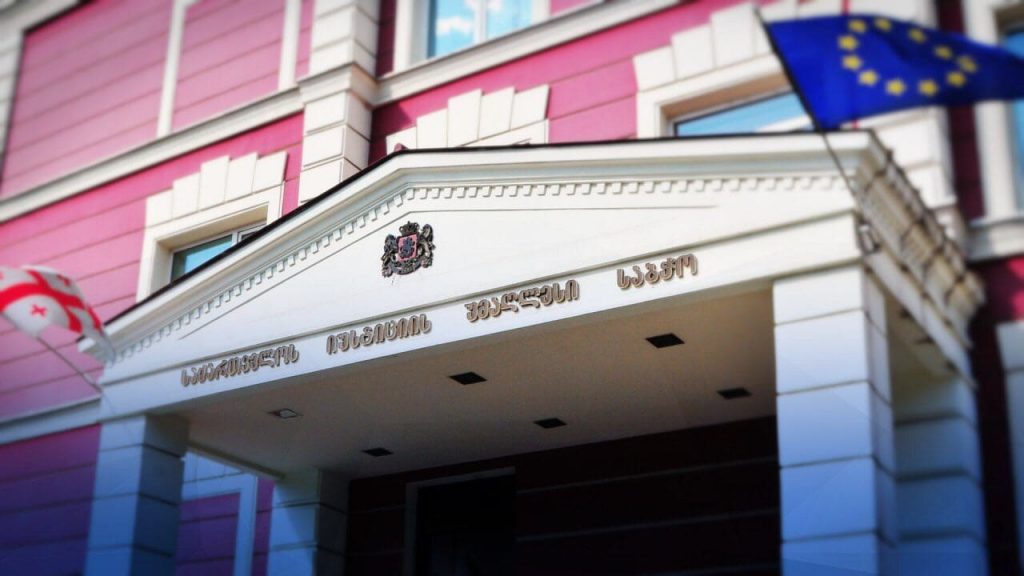The High Council of Justice (HCoJ) decided today to reelect controversial justice Mikheil Chinchaladze as the chairperson of the Tbilisi Court of Appeals for a term of five years. Chinchaladze, whose term expired in May, was first elected to the post on May 30, 2017.
Georgian civil society organizations regard Chinchaladze as one of the leaders of ‘a judicial clan,’ a powerful government-aligned group of a handful of justices holding sway over their colleagues.
HCOJ, a 15-member body that oversees Georgia’s judiciary and currently has only ten active members, told Civil.ge that it unanimously endorsed Chinchaladze, the sole candidate, as the chairperson.
Nazi Jazenashvili, a former non-judge member of the HCoJ and founder of the Georgian Court Watch NGO, noted that during the round of consultations with the justices from the Court of Appeals, none of the 53 judges dissented Chinchaladze’s candidacy.
She told reporters after the appointment that Chinchaladze needs the official position for the “privileges” that come with it. “His influence is bigger than just this one court in Tbilisi. It extends from the Supreme Court to any court of the first instance.”
Ana Dolidze, another former non-judicial HCoJ member and For People political party founder, said that “the clan, the [ruling party] Georgian Dream, and [ex-PM and GD founder] Bidzina Ivanishvili” have crossed a line by pushing for Chinchaladze’s second term at the Court of Appeals.
CSO Statement Against Chinchaladze
A week ago, on June 20, Georgian civil society organizations urged the High Council of Justice to not support the “judicial clan” by electing Chinchaladze for another five years, and criticized the transparency of the process.
The CSOs alleged that amid growing domestic and international criticism of the Georgian judiciary, “the Council of Justice appears to be covertly trying to maintain clan rule in the judiciary.”
The watchdogs recalled that Chinchaladze entered the judiciary system from the ranks of prosecutors in 2007 when the Prosecutor’s Office influenced the appointment of a group of judges to help it exert “informal control” over the judicial system.
- Venice Commission Slams Changes to Court Law
- European Commission’s Memo Detailing Recommendations for Georgia
The organizations also pointed to another case in 2016, when Chinchaladze’s ten-year term on the Supreme Court was expiring and the Georgian Parliament chose to re-amend law that was tailored to allow Chinchaladze’s reappointment indefinitely. CSOs said it is thanks to this law that Chinchaladze has been serving in the Appeals Court since 2017.
The judicial watchdogs also referenced the European Commission’s opinion on Georgia’s EU candidate status, dated June 17, which criticized the lack of independence in the judiciary. The CSOs said that “the clan,” by extending the term of office of its leader, “damages the country’s European integration path.”
The CSOs also highlighted that the five empty slots on the HCoJ, which are meant to be filled by non-judicial members to guarantee the involvement of the public, point to significant issues in its independence.
They stressed that by not filling those slots, the Parliament violates the Georgian law and that any decision made by the HCOJ fails to meet the standards outlined in the Constitution.
The Georgian Court Watch, Group of Independent Lawyers, Democracy Index – Georgia, Democracy Research Institute (DRI), Georgian Democracy Initiative (GDI), Civic Idea, Georgia’s Reforms Associates (GRASS), and the Europe-Georgia Institute are the signatories of the statement.
Also Read:
- U.S. Slams GD Over ‘Undermining Gov’t Accountability, Judiciary’
- Judiciary Developments: U.S. Slams ‘Closed System’
- EU Top Diplomat Concerned over Georgia’s ‘Stalled Judiciary, Electoral Reforms’
- EU Condemns ‘Fifth Setback’ in Georgian Judiciary
This post is also available in: ქართული (Georgian) Русский (Russian)

